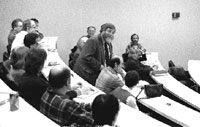

Phillip Morris lit up a debate on divestment by the College with a large grant to help fund the Environmental Studies building, one of a few large grants this year, .

The Phillip Morris foundation gave a $200,000 grant to the College in December to be used toward the new Environmental Studies building. The foundation is affiliated with the Phillip Morris corporation which has made its name as a major tobacco producer. Construction of the building is scheduled to begin in the Spring of 1998.
In 1996, Enviornmental Studies director and Professor David Orr contacted Phillip Morris. Orr was introduced to the Phillip Morris corporation by the Environmental Grant Makers Foundation, a philanthropy group that gives to environmental causes. In a series of meetings and visits, Orr, along with President of the College Nancy Dye, procured the grant.
Orr said, "Sure there are corporations that you don't want to deal with. But they learn from a partnership with an academic institution. Phillip Morris is looking into waste water treatment systems and zero emission buildings. Essentially we are accepting money from the foundation and putting it to good use."
Topping the Phillip Morris gift was a $6 million anonymous gift, the largest donation ever given by a living person.
The donation was made in honor of Hsiang Hsi Kung, a 1906 graduate of Oberlin who later became finance minister of China under Chiang Kai-Shek. The administration intends to use the money for the construction of a new science center, in honor of Kung's lifelong interest in science.
The Administration planned to recommend that the $6 million be put in high-yield investments. The College will then use the interest on the investment for the construction of the Science Center.
The Hong Kong law firm that handled the donation to Oberlin also supervised anonymous $6 million donations made to Yale and Wesleyan Universities at the same time.
The faxes to each college were sent on March 27 1997, but the one to Oberlin was mistakenly sent to admissions, so it was not until April 1st that the fax reached then Vice President of Development and Alumni Affairs, Young Dawkins.
Reports in major newspapers at the time emphasized the April Fool's Day connection. Dawkins then traveled to Hong Kong to confirm the authenticity of the donation. This visit was reciprocated when Peter Tsang traveled to Oberlin this summer.
In late November, the College received a $105,781 grant from the Hewlett Foundation to implement a project entitled "Common Ground: Education for Democracy." The program is intended to support multicultural affairs on campus and in the surrounding area. The grant is part of a cost-sharing project with the college in which the College will allocate $55,781 toward the project bringing the total budget to $161,562.
The grant proposal outlined a plan to begin a number of different programs on campus designed to bring traditionally separated groups closer together. "To date, Oberlin's efforts to encourage inter-cultural dialogue among students have often suffered for lack of a unifying agenda," the grant proposal stated.
Two funds will be set up to aid current student organizations. The first, an education fund, will give money to a coalition of at least two different student groups who seek solutions to the challenges that area schools face surrounding the issues of pluralism.
Speaking out: Professor of Politics Ronald Kahn addresses fellow faculty members at a general meeting. (file photo)
Copyright © 1998, The Oberlin Review.
Volume 126, Number 24, May 22, 1998
Contact us with your comments and suggestions.